Acne affects 85 percent of young adults, making it a common skin issue1. Many have tried expensive treatments with unwanted side effects. That’s why 77 percent of acne sufferers turn to natural acne remedies.
Science-backed home remedies can prevent acne and heal pimples. These include supplements, spot treatments, and dietary changes. Nonprescription products like benzoyl peroxide (2.5% to 10%) and salicylic acid (0.5% to 2%) show promise1.
Adapalene gel (0.1%), azelaic acid (10%), and alpha hydroxy acids are also effective1. They prevent clogged pores, reduce inflammation, and boost cell turnover. These ingredients lead to clearer, brighter skin1.
Lifestyle changes play a crucial role too. Wash your face twice daily, avoid irritants, and protect your skin from the sun1. A balanced diet and hydration can also improve your complexion.
Ready to say goodbye to acne? Let’s explore effective home treatments for clear skin. With patience and consistency, you’ll achieve the glowing complexion you deserve.
Key Takeaways
- 85% of young adults struggle with acne, and 77% have tried home remedies1.
- Effective nonprescription ingredients include benzoyl peroxide, salicylic acid, adapalene gel, azelaic acid, and alpha hydroxy acids1.
- Lifestyle changes like proper cleansing, avoiding irritants, and sun protection can improve acne1.
- A balanced diet and hydration play a crucial role in achieving clear skin.
- Consistency and patience are key when using home treatments for acne removal.
Visit us for top beauty supply reviews. We cover acrylic nails, nail polish remover, hair color kits, and more. Find the best products for your beauty needs.
Understanding Acne: Causes and Symptoms
Acne is a widespread skin issue affecting millions globally. About 9.4% of people worldwide have acne2. In the US, it’s the most common skin condition.
Up to 50 million Americans deal with acne yearly23. Knowing its causes and symptoms helps treat and prevent breakouts effectively.
What is Acne and What Causes It?
Acne happens when hair follicles get clogged with oil and dead skin. Excess sebum, an oily substance, is the main cause. Too much sebum can block pores.
This creates a perfect place for bacteria, especially P. acnes, to grow. As the body fights the bacteria, inflammation occurs, leading to acne lesions.
Several factors can trigger acne:
- Hormonal changes during puberty or pregnancy2
- Genetics
- Diet, particularly high-glycemic foods, milk products, and certain fats2
- Stress
- Certain medications
Common Symptoms of Acne
Acne can show up in different ways. The most common symptoms include:
- Whiteheads: Small, closed comedones that appear as white bumps on the skin
- Blackheads: Open comedones with a dark appearance due to oxidation of the trapped sebum
- Papules: Inflamed, red bumps that may be tender to the touch
- Pustules: Pus-filled lesions, commonly known as pimples
- Nodules: Large, painful, solid lumps beneath the skin’s surface
- Cysts: Deep, pus-filled lesions that can cause scarring
Acne can range from mild to severe. Mild acne usually has few whiteheads, blackheads, and pimples. Severe acne may have many nodules and cysts.
Most pimples clear up in one to two weeks. Severe acne might take several weeks to clear with treatment4.
Knowing acne’s causes and symptoms helps you fight breakouts. A good skincare routine can reduce blemishes. This includes gentle cleansing, exfoliating, and keeping skin moisture balanced.
Use non-comedogenic products and eat a balanced diet to prevent pimples. These steps can help you eliminate acne breakouts.
Be patient with your acne treatment. Clear skin takes time and effort. Check back for reviews on beauty supplies, including acrylic nails and hair growth serums.
Natural Remedies for Acne Treatment
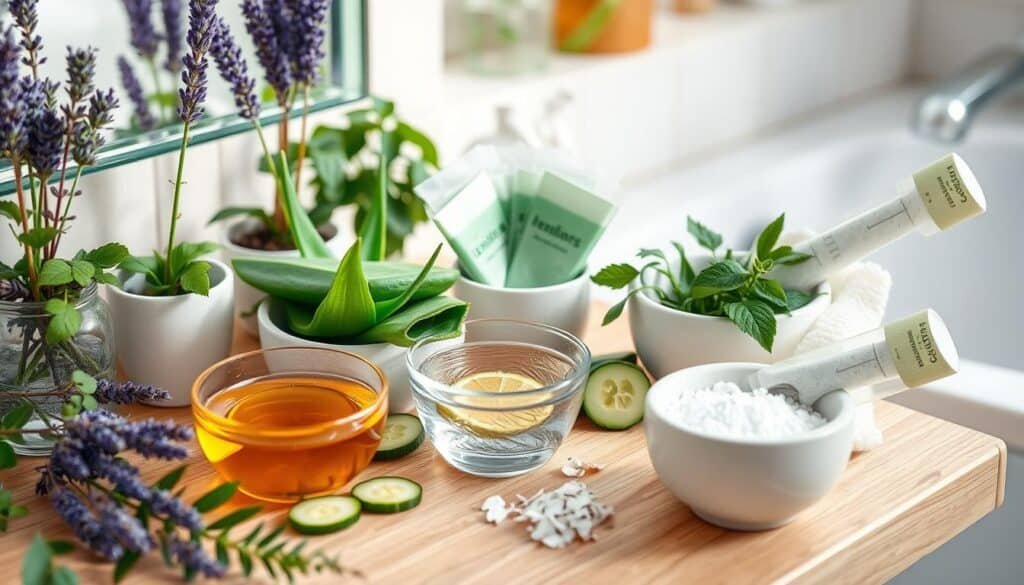
Acne affects 85 percent of young adults worldwide. Many seek natural solutions for clearer skin. Let’s explore some DIY acne masks and treatments that may help.
Apple Cider Vinegar
Apple cider vinegar may reduce acne-causing bacteria. Its antibacterial properties could help fight acne. Always dilute it to avoid skin irritation.
Honey and Cinnamon Mask
Honey and cinnamon bark extract show antibacterial effects against P. acnes. Raw honey promotes healing but can’t prevent breakouts. Evidence for honey’s effect on acne is limited.
Tea Tree Oil
Tea tree oil can reduce acne effectively. It may work better than benzoyl peroxide. Dilute it properly to prevent skin irritation.
Green Tea
Green tea extract can reduce sebum production and pimples. It may decrease whiteheads and blackheads significantly. The extract provides mild anti-inflammatory effects.
Witch Hazel
Witch hazel may fight bacteria and reduce skin irritation. It can calm red, irritated pimples. However, it doesn’t prevent new breakouts.
Results may vary with these natural remedies. Patch test new products before using them. Consult a dermatologist if acne persists or worsens.
Stay patient and consistent on your journey to clearer skin. Check back for reviews on beauty supplies and skin care products.
how to get rid of acne home treatment
Acne frustrates many people, but effective solutions exist. It’s the most common skin issue in the U.S., affecting adults and teens alike5. Fortunately, several home treatments can help clear your skin and boost your complexion.
Apple cider vinegar is a popular acne remedy. Mix 1 part vinegar with 3 parts water and apply gently. Its acetic acid fights bacteria and reduces inflammation, making it effective for mild acne6.
A honey and cinnamon mask is another powerful treatment. Honey fights bacteria while cinnamon reduces inflammation. Mix 2 tablespoons honey with 1 teaspoon cinnamon and apply for 10-15 minutes. This mask helps unclog pores, often the root of pimples5.
Tea tree oil’s antimicrobial properties combat acne-causing bacteria. Dilute it before use: mix 1 part oil with 9 parts water. Apply the mixture to your skin using a cotton swab.
I’ve found that using a combination of these home treatments has helped to significantly reduce my acne and improve the overall health of my skin.
Green tea’s antioxidants reduce inflammation and protect skin. Apply cooled green tea to your face with a cotton ball. Or, add tea leaves to a honey mask for extra benefits.
Witch hazel, a natural astringent, tightens pores and reduces inflammation. Boil the bark, strain the liquid, and apply it to your skin. Many adults can treat mild acne with over-the-counter products containing salicylic acid or benzoyl peroxide65.
| Home Treatment | Benefits | How to Use |
|---|---|---|
| Apple Cider Vinegar | Kills bacteria, reduces inflammation | Mix 1 part vinegar with 3 parts water, apply with cotton ball |
| Honey and Cinnamon Mask | Unclogs pores, antibacterial, anti-inflammatory | Mix 2 tbsp honey with 1 tsp cinnamon, apply to face, rinse after 10-15 min |
| Tea Tree Oil | Antimicrobial, kills acne-causing bacteria | Mix 1 part oil with 9 parts water, apply with cotton swab |
| Green Tea | Antioxidants reduce inflammation and protect skin | Steep tea, cool, apply to face or add leaves to honey mask |
| Witch Hazel | Astringent tightens pores, reduces inflammation | Boil bark, strain liquid, apply with cotton ball |
Remember, everyone’s skin is unique. What works for one person might not work for another. If pregnant or trying to conceive, consult a dermatologist before treating acne6.
If self-treatment doesn’t yield results after several weeks, consider seeking professional help6. Don’t give up – clear skin is possible with patience and the right approach.
Check back often for the best reviews on beauty supplies, including the best hair growth serum, best acrylic nails, best moisturizer for dry skin, best makeup brushes, best cruelty-free makeup, best foundation for oily skin, best vegan beauty products, best anti-aging cream, best hair color kit, best beauty blender, best skincare routine, and best nail polish remover.
Dietary Changes for Clear Skin
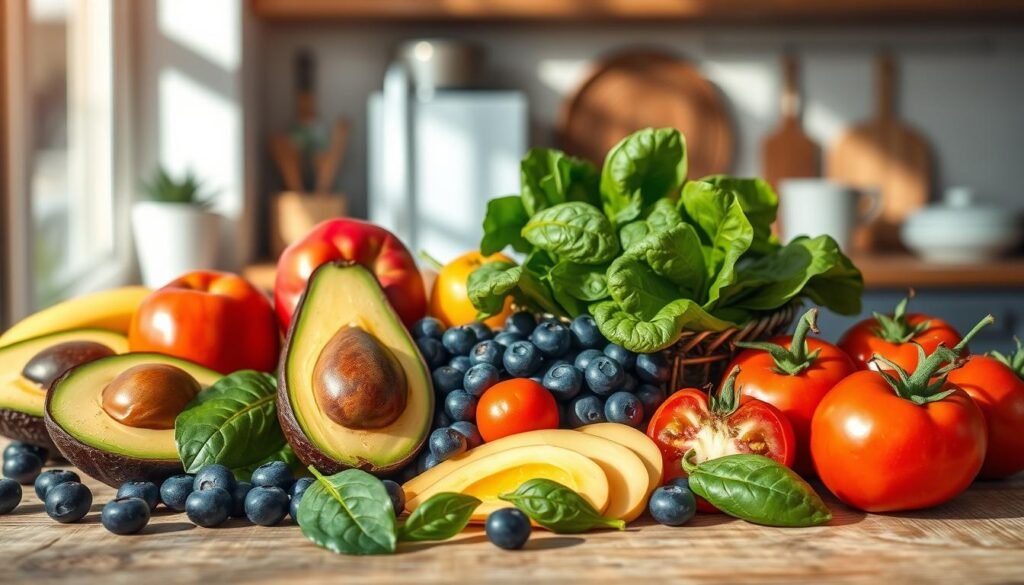
Dietary choices can affect skin health, according to a 2022 study review. Skin-friendly foods support your body’s healing processes. They can improve your skin’s overall appearance.
There’s no one-size-fits-all solution for clear skin. However, dietary changes can be a powerful tool. Focus on incorporating beneficial foods and avoiding potential acne triggers.
Foods to Avoid
High glycemic foods can increase acne risks. These include refined carbohydrates and sugary snacks. They cause blood sugar spikes, leading to higher IGF-1 levels.
The Western diet is linked to higher inflammation levels. It’s high in glycemic carbs, dairy, sodium, red meats, and unhealthy fats. This can impact acne.
Cow’s milk may worsen acne and reduce treatment effectiveness. Women drinking 2+ glasses of skim milk daily were 44% more likely to have acne.
Foods to Incorporate
Complex carbohydrates can reduce acne development. These include whole grains, legumes, fruits, and vegetables. Zinc, vitamins A, C, E, curcumin, and biotin enhance skin health.
Probiotics and omega-3 fatty acids may reduce acne. They can improve oral acne medication absorption. Skin-friendly foods include yellow and orange fruits and dark leafy vegetables.
Fish high in omega-3s, nuts, and whole grains are good choices. Omega-3 rich foods may reduce inflammation and improve acne symptoms.
| Foods to Avoid | Foods to Incorporate |
|---|---|
| High glycemic foods (refined carbs, sugary snacks) | Complex carbohydrates (whole grains, legumes, fruits, vegetables) |
| Cow’s milk and skim milk | Foods rich in omega-3 fatty acids (fish, nuts, seeds) |
| Western diet (high in unhealthy fats, red meat, sodium) | Antioxidant-rich foods (yellow and orange fruits, dark leafy greens) |
Importance of Hydration
Staying hydrated is crucial for clear skin. Dehydration can lead to dry, irritated skin that may worsen acne. Drink plenty of water throughout the day to support skin health.
Dietary changes are a safe approach to reducing acne. Adding omega-3s, probiotics, and low glycemic foods may help. Dairy, high glycemic foods, and sugars may worsen acne7.
Be patient with your clear skin routine. Dietary changes may take up to 12 weeks to show noticeable effects. Consistency is key to achieving a healthy, glowing complexion.
Visit us for top beauty supply reviews. We cover acrylic nails, nail polish remover, hair products, skincare, and makeup essentials.
Conclusion
Acne affects millions of American teens and adults, causing severe breakouts8. Topical retinoids like adapalene and tretinoin are top acne treatments9. Natural remedies and lifestyle changes are gaining popularity for managing acne.
Home treatments like apple cider vinegar and tea tree oil may reduce acne symptoms89. These remedies have anti-inflammatory and antibacterial properties. Dietary changes can also contribute to clearer skin.
Avoiding trigger foods and adding skin-friendly nutrients may help manage acne9. A good skincare routine includes gentle cleansing and anti-acne ingredients. Consult a dermatologist for persistent acne and personalized treatment options9.
I’m exploring the best beauty products for clear, healthy skin. This includes vegan and cruelty-free options. I’m also looking into anti-aging creams and foundations for oily skin.
With natural remedies and targeted treatments, I aim to manage my acne. I’ll keep reviewing beauty supplies like nail polish remover and hair color kits. Check back for updates on skincare routines, moisturizers, and makeup brushes.
FAQ
What are some effective home remedies for treating acne?
How can I prevent acne breakouts?
What are some affordable acne solutions I can try at home?
How can I get rid of acne scars?
What role does diet play in achieving clear skin?
Source Links
- Nonprescription acne treatment: Which products work best? – https://www.mayoclinic.org/diseases-conditions/acne/in-depth/acne-treatments/art-20045814
- What Causes Acne and How Can I Prevent It? – https://www.healthline.com/health/skin/acne
- Acne: Causes, treatment, and tips – https://www.medicalnewstoday.com/articles/107146
- Acne: Types, Causes, Treatment & Prevention – https://my.clevelandclinic.org/health/diseases/12233-acne
- 6 Ways to Get Rid of Pimples Fast | Saguaro Dermatology – https://saguaroderm.com/acne-treatment/
- Adult acne treatment dermatologists recommend – https://www.aad.org/public/diseases/acne/diy/adult-acne-treatment
- Anti-Acne Diet: Can Food Help or Worsen Acne? – https://www.healthline.com/health/anti-acne-diet
- How to get rid of acne naturally | Apostrophe – https://www.apostrophe.com/slather/how-to-get-rid-of-acne-naturally/
- How to Get Rid of Pimples Overnight: Proven Tactics – https://www.buzzrx.com/blog/how-to-get-rid-of-pimples-overnight


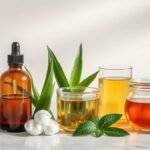
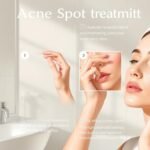
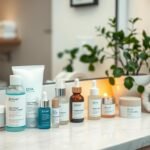
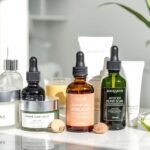

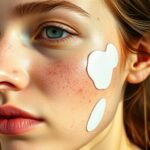
Interesting read, but isnt it possible that commercial acne products could be more effective than these home treatments? Just a thought.
Interesting article, but arent we overlooking diets role in acne? Surely, a burger binge would worsen the problem, right?
Surely, but blaming burgers alone oversimplifies acnes complex nature, dont you think?
The articles good but dont you guys think that acnes more about internal health rather than just surface-level issues?
Interesting read, but Im curious – isnt diet a major acne influencer? Why no mention of dietary changes?
Interesting read, but isnt it true that diet plays a major role in acne? Why no mention of food and lifestyle changes?
Perhaps the author wanted to focus on other factors. Diet isnt the only acne catalyst.
Interesting read, but isnt it strange how we focus on treating acne instead of finding what really triggers it? Just a thought.
Interesting read but honestly, isnt diet more important than topical treatments for acne? Were overlooking foods role here.
Interesting read, but isnt it also possible that acne is more of an internal issue rather than just external? Food for thought.
Absolutely! Its high time we stop demonizing chocolate and start blaming hormones!
Guys, ever think maybe acnes not the enemy here but our obsession with perfect skin? Food for thought… #SkinPositivity
Interesting read, but isnt it kinda odd that diet isnt mentioned? Cant our food habits affect acne too? Just a thought!
Absolutely, food impacts everything! Skincares not just topical, its what we ingest too.
Really? Ive heard that diet has more impact on acne than any home treatment. Arent we just treating symptoms here?
Diets influence is undeniable, but dont underestimate the power of home treatments. Balance is key!
Interesting read, but has anyone considered the role of diet in acne? Maybe its not just about treatments but prevention too?
Interesting read, but isnt constantly messing with skins natural oils creating more acne problems? Thoughts? #skincaredebate
Interesting read, but isnt it true that diet and stress levels impact acne more than any home remedies? Just a thought.
Diet and stress play a part, sure. But dont discount the power of home remedies.
Just my two cents, but isnt blaming diet solely for acne an oversimplification? Genetics, hormonal imbalance also play their part, right?